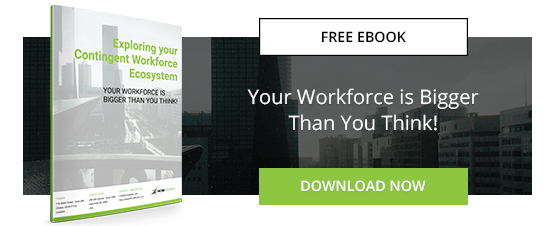One of the biggest challenges of scaling a start-up business, especially a service related business, is managing incoming work against internal resources that can execute and get the job done. A business owner might not feel ready to commit to full-time resources until the next level of project work or clients have been acquired, but staff resources may be strained and extra help is needed.
A solution may be to scale your business with the help of a scalable workforce.
In 'Should I Hire a Contractor or an Employee?' Raymond Grainer wrote, “Scalability, by definition, is the ability to change in size. Service companies and other knowledge-based businesses are unique from other firms in that they scale by adding people.” If your business is turning down big projects or clients because of lack of human capital band-width, you may want to consider a contingent workforce solution. Grainer added, “Tapping into a network of providers is a really strong strategy for growing a business. Then it’s always possible to say yes to more work. Keeping a reliable, trustworthy, solid base of contractors who can be hired ad-hoc is a good idea.”
Each business situation will be unique, but here are three indications that hiring a freelancer, independent contractor or contingent worker is a good match for your business.
1. The business does not have the talent needed to complete the work. If, for example, the business is lacking a specific skill set, or a new project requires a specialized talent - the answer is to acquire a freelancer or independent contractor to complete the work for you.
2. Workload is uncertain. If your client list is wavering, or project work is up and down, you can smooth out the ride with a contingent workforce that is flexible to demand.
3. The business doesn’t have the band-width. If your organization is showing signs of strain, getting extra help by going with contractors can give you time to re-evaluate staffing.
The benefits of pursuing a growth strategy using a contingent workforce include: specialized talent that can be used to train your full-time staff (knowledge transfer), cost savings over FTEs, no need to purchase extra equipment (contractors often use their own computers etc.), less office space (often contractors work remotely for periods of time), get up to speed fast on the project (contractors bring ready to apply experience).
In addition to providing an effective scale-up strategy - utilizing independent contractors as a part of your workforce management strategy brings other advantages. If you are uncertain, you can always consult with a contingent workforce advisory specialist, who can unlock the financial and organizational benefits for you more effectively, giving you more time to focus on growing your company.
About HCMWorks
We are a contingent workforce service provider helping organizations gain better access to talent through the use of independent contractors, consultants, temporary workers, freelancers and other non-payrolled employees. We provide the expertise, the technology, and processes to help you reduce your workforce costs, mitigate against misclassification and co-employment risks, and increase the efficiency and timeliness of your contingent recruitment process. Read more about what our clients say about us here.



